De Amerikaanse schrijfster en essayiste Siri Hustvedt werd geboren op 19 februari 1955 in Northfield, Minnesota. Zie ook mijn blog van 19 februari 2007 en ook mijn blog van 19 februari 2009 en ook mijn blog van 19 februari 2010.
Uit: Wat me lief was (Vertaald door Heleen ten Holt)
„Ieder incident speelde zich af volgens hetzelfde vaste patroon: eerste de treurige ontdekking, dan de woede van de getroffene, dan Marks terugkomst en heftige ontkenningen. Ja, hij was weggelopen, maar hij had niets slechts gedaan. Hij had rondgelopen in de stad. Dat was alles. Hij had behoefte om alleen te zijn. Hij had niet ’s nachts in Philips auto gereden. Als er een deuk achter het portier zat, had iemand anders de stationwagon zeker gestolen. Ja, hij was die nacht van huis weggelopen, maar hij had geen geld gestolen. Violet vergiste zich, waarschijnlijk had ze het uitgegeven of verkeerd geteld. Marks verontwaardigde ontkenningen waren vreemd irrationeel. Alleen als hij met een direct bewijs werd geconfronteerd, bekende hij schuld. Als je erop terugkijkt was alles wat Mark deed akelig voorspelbaar, maar we keken toentertijd geen van allen terug, en hoewel zijn gedrag volgens een cyclus verliep, waren we niet helderziend. We konden de dag van zijn rebellie niet voorspellen.
Mark was een raadsel dat op verschillende manieren kon worden uitgelegd. Het kwam me voor dat er twee manieren waren om zijn gedrag te begrijpen, die allebei een vorm van dualisme betroffen. De eerste was manicheïstisch. Marks dubbele leven was een slinger die tussen licht en donker heen en weer zwaait. Een deel van hem wilde echt zijn best doen. Hij hield van zijn ouders en zijn vrienden, maar hij werd met regelmatige tussenpozen overvallen door plotselinge impulsen, waar hij aan toegaf.“
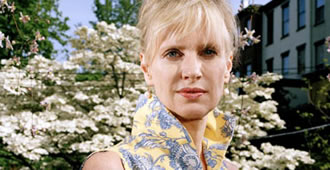
Siri Hustvedt (Northfield, 19 februari 1955)
De Engelse schrijfster Helen Fielding werd geboren in Morley, Yorkshire op 19 februari 1958. Zie ook mijn blog van 19 februari 2009 en ook mijn blog van 19 februari 2010.
Uit: Bridget Jones’s Diary
“Julie Enderby’s got one. She says she never uses anything else.”
“Who’s Julie Enderby?”
“You know Julie, darling! Mavis Enderby’s daughter. Julie! The one that’s got that super-dooper job at Arthur Andersen …”
“Mum …”
“Always takes it on her trips …”
“I don’t want a little bag with wheels on.”
“I’ll tell you what. Why don’t Jamie, Daddy and I all club together and get you a proper new big suitcase and a set of wheels?”
Exhausted, I held the phone away from my ear, puzzling about where the missionary luggage-Christmas-gift zeal had stemmed from. When I put the phone back she was saying: “… in actual fact, you can get them with a compartment with bottles for your bubble bath and things. The other thing I thought of was a shopping cart.”
“Is there anything you’d like for Christmas?” I said desperately, blinking in the dazzling Bank Holiday sunlight.
“No, no,” she said airily. “I’ve got everything I need. Now, darling,” she suddenly hissed, “you will be coming to Geoffrey and Una’s New Year’s Day Turkey Curry Buffet this year, won’t you?”
“Ah. Actually, I …” I panicked wildly. What could I pretend to be doing? “… think I might have to work on New Year’s Day.”
“That doesn’t matter. You can drive up after work. Oh, did I mention? Malcolm and Elaine Darcy are coming and bringing Mark with them. Do you remember Mark, darling? He’s one of those top-notch barristers. Masses of money. Divorced. It doesn’t start till eight.”
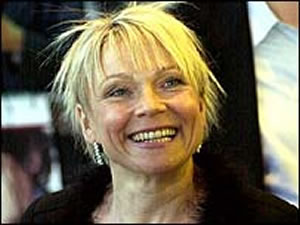
Helen Fielding (Morley, 19 februari 1958)
De Estlandse schrijver Jaan Kross werd geboren op 19 februari 1920 in Tallin. Zie ook mijn blog van 19 februari 2007 en ook mijn blog van 19 februari 2008 en ook mijn blog van 19 februari 2009 en ook mijn blog van 19 februari 2010.
Uit : Uncle (Vertaald door Eric Dickens)
« The chain led back to the spring of 1941, that is to say when the order had arrived in Tartu from a certain adviser to Herr Litzmann at the General Commission in Tallinn to swiftly pack together and transport, in part to Tallinn, in part to country manor houses, such-and-such valuable collections housed in the University Library. Those items most valuable from a German cultural (and, consequently, global cultural) point of view were to go to Tallinn, those of lesser importance to the stone cellars of suitable manor houses throughout the Province of Tartumaa.
The order to set to work the appropriate librarians plus those assistants they had come from the Vice-Chancellor of the university. Carpenters had begun (swearing as always) knocking together crates, heads of department (anxious as always) bustling about and directing operations, bibliographers (critical and whispering as always) making book inventories and packers-cum-bearers (sweating and sniffing as always) lugging piles of books and manuscripts down creaking flights of stairs. Each, of course, according to his nature. Perfunctorily and smoothly, assiduously and laboriously, thoughtlessly and twitteringly, inquisitively and mutteringly. Some hurried, others dawdled, some made sure the order was carried out to the letter while others again tried to find the easiest way of wriggling out of it. For there were two, even three attitudes for the order and as many reasons for carrying it out.
Some wished to do everything correctly. More rapidly or more slowly but above all, correctly. Others were indifferent to results as long as they got the mark notes and penni coins at the end of the day to pay for the items printed on their ration coupons. A third group which formed after much cursing and whispering among themselves, a group which grew even larger after the thin cigarettes and dishwater coffee of the lunch break, well, this third group began to hatch their own plans. Why should the most valuable items be packed in the first place? To save them from air raids? All well and good. But not only for that reason.“
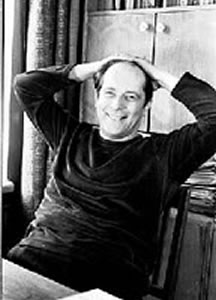
Jaan Kross (19 februari 1920 – 27 december 2007)
De Duitse schrijver Herbert Rosendorfer werd op 19 februari 1934 in Gries geboren. Zie ook mijn blog van 19 februari 2007 en ook mijn blog van 19 februari 2008 en ook mijn blog van 19 februari 2009 en ook mijn blog van 19 februari 2010.
Uit: Briefe in die chinesische Vergangenheit
« Zweiter Brief
(Samstag, ‘3. Juli)
[…] Aber ich sage Dir: tausend Jahre sind mehr als vergangene Zeit. Tausend Jahre sind ein so gewaltiger Berg von Zeit, daß selbst die kühnsten Vögel phantastischer Gedanken ihn nicht zu überfliegen vermögen.
Tausend Jahre sind nicht »jetzt« und »damals«.
Tausend Jahre sind »hier« und »dort«. Ich werde beim »hier« bleiben.
Ich bin sehr glücklich, daß ich den Kontaktpunkt, an dem ich diesen Brief niederlegen werde, wiedergefunden habe. Es ist mir dank eines Mannes gelungen, der mir viel geholfen hat und noch hilft. Mehr von ihm berichte ich Dir demnächst. Anders als mit fremder Hilfe hätte ich den Kontaktpunkt nicht gefunden, denn unser K’ai-feng hat sich so vollständig geändert, daß ich meine, es müßte eine andere Stadt sein. Das hängt vielleicht damit zusammen, daß der Fluß seinen Lauf gewechselt hat; er fließt jetzt fast genau nach Norden.
Die Stadt ist unvorstellbar grüß geworden, und es ist nahezu unerträglich laut. Von keinem einzigen der Paläste, die uns für die Ewigkeit gebaut erscheinen, ist auch nur eine Spur noch vorhanden (soweit ich das bisher gesehen habe), von den einfachen Häusern ganz zu schweigen. Selbst die Hügel sind weg. Alles ist flach, dafür sind die Häuser aufgetürmt wie zackige Berge, und kaum ein Baum ragt über die Häuser hinaus. Du würdest nichts, aber auch gar nichts wieder-erkennen. Wie das alles zugegangen ist, kann ich mir nicht vorstellen. Ich traue unseren barbarischen Enkeln — ich kann Dir sagen: ein würdeloser, verrohter Haufen — zu, daß sie die Hügel abgetragen haben.
Selbst unser Himmel, scheint es mir, hat sich aus dem ständigen Dunst und Ruß in eine fernere Welt zurückgezogen. Es kommt mir fast vor, als wäre ich nicht nur zeitlich, sondern auch örtlich versetzt.
Ich sitze hier, während ich das schreibe, auf einem Stein. Der Lärm, der mich umtost, ist nicht übermä-
ßig; ein, zwei Li* weiter ist er viel schlimmer. Nicht weit von dem Stein muß das kleine Sommerhaus sein, wo ich Dich vor tausend Jahren und drei Tagen zum Abschied umarmt habe. »
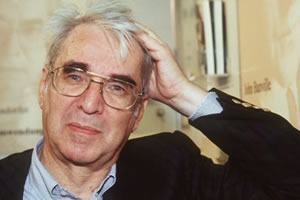
Herbert Rosendorfer (Gries, 19 februari 1934)
De Amerikaanse schrijfster Amy Tan werd geboren in Oakland, Ohio, op 19 februari 1952. Zie ook mijn blog van 19 februari 2007 en ook mijn blog van 19 februari 2009 en ook mijn blog van 19 februari 2010.
Uit : A Brief History of My Shortened Life
« It was not my fault. If only the group had followed my original itinerary without changing it hither, thither, and yon, this debacle would never have happened. But such was not the case, and there you have it, I regret to say.
“Following the Buddha’s Footsteps” is what I named the expedition. It was to have begun in the southwestern corner of China, in Yunnan Province, with vistas of the Himalayas and perpetual spring flowers, and then to have continued south on the famed Burma Road. This would allow us to trace the marvelous influence of various religious cultures on Buddhist art over a thousand years and a thousand miles—a fabulous journey into the past. As if that were not enough appeal, I would be both tour leader and personal docent, making the expedition a truly value-added opportunity. But in the wee hours of December 2nd, and just fourteen days before we were to leave on our expedition, a hideous thing happened . . . I died. There. I’ve finally said it, as unbelievable as it sounds. I can still see the tragic headline: “Socialite Butchered in Cult Slaying.”
The article was quite long: two columns on the left-hand side of the front page, with a color photo of me covered with an antique textile, an exquisite one utterly ruined for future sale.
The report was a terrible thing to read: “The body of Bibi Chen, 63, retail maven, socialite, and board member of the Asian Art Museum, was found yesterday in the display window of her Union Square store, The Immortals, famed for its chinoiserie. . . .” That odious word—”chinoiserie”—so belittling in a precious way. The article continued with a rather nebulous description of the weapon: a small, rakelike object that had severed my throat, and a rope tightened around my neck, suggesting that someone had tried to strangle me after stabbing had failed. »
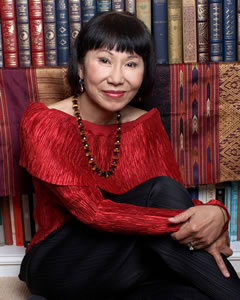
Amy Tan (Oakland, 19 februari 1952)
Zie voor nog meer schrijvers van de 19e februari ook mijn vorige blog van vandaag en eveneens mijn eerste blog van vandaag.
